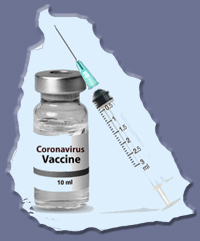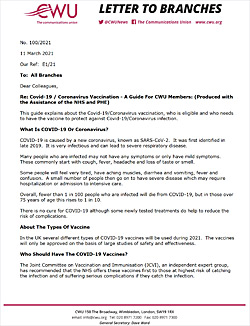Produced with the Assistance of the NHS and PHE, CWU’s
National Health, Safety & Environment Officer, Dave Joyce has provided to ALL CWU Branches via LTB100/21; Covid-19 / Coronavirus Vaccination – A Guide For CWU Members.
Downloadable from the Unionsafety E-Library in its original format, the Vaccination Guide is reproduced in full below:
This guide explains about the Covid-19/Coronavirus vaccination, who is eligible and who needs to have the vaccine to protect against Covid-19/Coronavirus infection.
 What Is COVID-19 Or Coronavirus?
What Is COVID-19 Or Coronavirus?
COVID-19 is caused by a new coronavirus, known as SARS-CoV-2. It was first identified in late 2019. It is very infectious and can lead to severe respiratory disease.
Many people who are infected may not have any symptoms or only have mild symptoms. These commonly start with cough, fever, headache and loss of taste or smell.
Some people will feel very tired, have aching muscles, diarrhea and vomiting, fever and confusion. A small number of people then go on to have severe disease which may require hospitalization or admission to intensive care.
Overall, fewer than 1 in 100 people who are infected will die from COVID-19, but in those over 75 years of age this rises to 1 in 10.
There is no cure for COVID-19 although some newly tested treatments do help to reduce the risk of complications.
About The Types Of Vaccine
In the UK several different types of COVID-19 vaccines will be used during 2021. The vaccines will only be approved on the basis of large studies of safety and effectiveness.
Who Should Have The COVID-19 Vaccines?
The Joint Committee on Vaccination and Immunisation (JCVI), an independent expert group, has recommended that the NHS offers these vaccines first to those at highest risk of catching the infection and of suffering serious complications if they catch the infection.
This includes older adults, frontline health and social care workers, care home residents and staff, and those with certain clinical conditions. When more vaccine becomes available, the vaccines will be offered to other people at risk as soon as possible.
What Can I Do After I Have Had The COVID-19 Vaccine?
The vaccine cannot give you COVID-19 infection and two doses will reduce your chance of becoming seriously ill. It is not yet known how much it will reduce the chance of you catching and passing on the virus. So, it is important to continue to protect those around you.
Remember to protect yourself and your family, friends and colleagues you MUST still follow any national or local restrictions and:
- Practice social distancing
- Wear a face mask
- Wash your hands regularly
Am I At Increased Risk From COVID-19 Infection?
Coronavirus can affect anyone. If you are an older adult and have a long-term health condition, COVID-19 can be very serious and in some cases fatal.
 You Should Have The COVID-19 Vaccine If You Are:
You Should Have The COVID-19 Vaccine If You Are:
- an adult living or working in a care home for the elderly
- a frontline healthcare worker
- a frontline social care worker
- a carer working in domiciliary care
- the sole or main carer for a highly vulnerable individual
- aged 65 years and over
- younger adults with long-term clinical conditions (see below)
The vaccine will also be offered to adults with conditions such as:
- a blood cancer (such as leukaemia, lymphoma or myeloma)
- diabetes
- dementia
- a heart problem
- a chest complaint or breathing difficulties, including bronchitis, emphysema or severe asthma
- a kidney disease
- a liver disease
- lowered immunity due to treatment for cancer (including chemotherapy and radiotherapy)
- lowered immunity from the treatment of conditions such as rheumatoid arthritis, lupus and psoriasis
- disorders of the immune system (including (HIV infection)
- having had an organ transplant
- having had a stroke or a transient ischaemic attack (TIA)
- a neurological or muscle wasting condition
- a severe or profound learning disability
- a problem with your spleen, e.g., sickle cell disease, or having had your spleen removed
- are seriously overweight (BMI of 40 and above)
- are severely mentally ill
All people who are in the Clinically Extremely Vulnerable group will be eligible for a COVID-19 vaccine. When you are offered the vaccine may depend on the severity of your condition. Your GP can advise on whether you are eligible.
Who Cannot Have The Vaccine?
The vaccines do not contain organisms that grow in the body, and so are safe for people with disorders of the immune system. These people may not respond so well to the vaccine. A very small number of people who are at risk of COVID-19 cannot have the vaccine – this includes some people who have severe allergies.
Who Should Wait To Have The Vaccine?
If you are currently unwell, self-isolating, or waiting for a COVID-19 test you should delay vaccination until later.
Pregnant women may prefer to wait to have the vaccine until they have completed their pregnancy. Read the detailed information on www.nhs.uk/covidvaccination
Will The Vaccine Protect Me?
The COVID-19 vaccination will reduce the chance of you suffering from COVID-19 disease. It may take a few weeks for your body to build up some protection from the vaccine.
Like all medicines, no vaccine is completely effective – some people may still get COVID-19 despite having a vaccination, but this should be less severe.
If you need more information on symptoms visit www.nhs.uk/conditions/coronavirus-covid-19/symptoms
Will The Vaccine Have Side Effects?
Like all medicines, vaccines can cause side effects. Most of these are mild and short-term, and not everyone gets them. Even if you do have symptoms after the first dose, you still need to have the second dose. Although you should get good protection from the first dose, having the second dose should give you longer lasting protection against the virus.
Very common side effects include:
- having a painful, heaving feeling and tenderness in the arm where you had your injection. This tends to be worst around 1-2 days after the vaccine
- feeling tired
- Headache
- general aches, or mild flu like symptoms
You can rest and take the normal dose of paracetamol (follow the advice in the packaging) to help you feel better. Although feeling feverish is not uncommon for two to three days, a high temperature is unusual and may indicate you have COVID-19 or another infection.
Symptoms following vaccination normally last less than a week. If your symptoms seem to get worse or if you are concerned, call NHS 111.
 If you do seek advice from a doctor or nurse please make sure you tell them about your vaccination (show them the vaccination card if possible) so that they can assess you properly.
If you do seek advice from a doctor or nurse please make sure you tell them about your vaccination (show them the vaccination card if possible) so that they can assess you properly.
You can also report suspected side effects to vaccines and medicines at the following link:
https://coronavirus-yellowcard.mhra.gov.uk/
If you are currently in the clinically extremely vulnerable group, please continue to follow the Government guidance.
Can I Catch COVID-19 From The Vaccine?
You cannot catch COVID-19 from the vaccine but it is possible to have caught COVID-19 and not realise you have the symptoms until after your vaccination appointment.
The most important symptoms of COVID-19 are recent onset of any of the following:
- a new continuous cough
- a high temperature
- a loss of, or change in your normal sense of taste or smell
If you have the symptoms above, stay at home and arrange to have a test.
Vaccine Priority Groups:
Phase 1 – Direct Prevention Of Mortality And Supporting The NHS And Social Care System
The first priorities for the Government COVID-19 vaccination programme is aimed at the prevention of mortality and the maintenance of the health and social care systems. As the risk of mortality from COVID-19 increases with age, prioritisation is primarily based on age. The order of priority for each group in the population corresponds with data on the number of individuals who would need to be vaccinated to prevent death, estimated from UK data obtained from March to June 2020.
Priority groups – vaccination order:
- residents in a care home for older adults and their carers
- all those 80 years of age and over and frontline health and social care workers
- all those 75 years of age and over
- all those 70 years of age and over and clinically extremely vulnerable individuals
- all those 65 years of age and over
- all individuals aged 16 years to 64 years with underlying health conditions which put them at higher risk of serious disease and mortality
- all those 60 years of age and over
- all those 55 years of age and over
- all those 50 years of age and over
It is estimated that taken together, these groups represent around 99% of preventable mortality from COVID-19.
Implementation of the COVID-19 vaccine programme aims to achieve high vaccine uptake. An age-based programme will likely result in faster delivery and better uptake in those at the highest risk. Implementation should also involve flexibility in vaccine deployment at a local level with due attention to:
- mitigating health inequalities, such as might occur in relation to access to healthcare and ethnicity
- vaccine product storage, transport and administration constraints
- exceptional individualised circumstances
- availability of suitable approved vaccines, for example for specific age cohorts
Phase 2 – Will Be Aimed At Further Reduction In Hospitalisation And Targeted Vaccination Of Those At High Risk Of Exposure And/Or Those Delivering Key Public Services
As the first phase of the programme is rolled out in the UK, additional data will become available and this data will provide the basis for consideration of vaccination in groups that are at lower risk of mortality from Covid-19.
Vaccination of those at increased risk of exposure to Covid-19 due to their occupation could also be a priority in the next phase. This could include first responders, the military, those involved in the justice system, teachers, transport workers, and public servants essential to the pandemic response.
The Department of Health and Social Care will consider occupational vaccination in collaboration with other Government departments. (Note: The CWU Health, Safety & Environment Department has written to Ministers calling for the inclusion of CWU Members to be included in the Priority Occupations Group).
Phase 3 – The Rest Of The Population
Wider use of COVID-19 vaccines will provide a better understanding of effectiveness against infection and transmission in the population. Trials in children and pregnant women are underway to gain a better understanding of the safety and effectiveness of the vaccines in these persons. Government agencies will monitor data on vaccines in development also.
As more Phase 3 data becomes available on candidate COVID-19 vaccines the Joint Committee on Vaccination and Immunisation (JCVI) will be able to prepare further advice for policy makers in the UK.
Vaccine safety and effectiveness will be continually monitored by the Medicines and Healthcare products Regulatory Agency (MHRA), PHE, and JCVI.
As stated above, you can download Letter To Branches LTB100/21 from the Unionsafety E-Library using search word LTB100/21


 What Is COVID-19 Or Coronavirus?
What Is COVID-19 Or Coronavirus?  You Should Have The COVID-19 Vaccine If You Are:
You Should Have The COVID-19 Vaccine If You Are: 